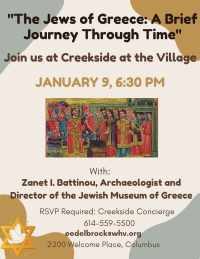January Events

Modern Greek Program Lecture: The Jews of Greece, by Zanet I. Battinou, Archaeologist and Direct of the Jewish Museum of Greece (January 9, 2024)
February Events
From PhD to Professor: Recent Grad Alumni Share Their Tips to Get on the Tenure Track (February 5, 2024, 10am-1pm)
Two recent Ph.D. history alumni, who landed tenure-track jobs, will speak on the successful navigation of the academic job market and the transition to a faculty member, with practical survival skills and tips! The event is sponsored by the Graduate Studies Committee and hosted through the Department of History.
Speakers: Ayşe Baltacıoğlu-Brammer (NYU) and Michael Beshay (Penn State)
Helen Dixon: Fit for a King: Reconstructing Sidonian Beliefs Based on Achaemenid Period Royal Tombs (February 5, 2024, 4pm-6pm)
This lecture is hosted by the Department of Near Eastern and South Asian Languages and Cultures (NESA).
Three necropoleis from the Phoenician city-state of Sidon (Saida, Lebanon) have produced royal or other elite burials from the first millennium BCE, dating largely to the Persian and Hellenistic periods (ca. 550-200 BCE). The stone sarcophagi include the longest known Phoenician inscription, as well as some of the best-known Phoenician art from the Levantine homeland. But the context of these sarcophagi—including burial site selection, tomb layout, inscription placement, and grave goods—is less well known. Studying these tombs in conjunction with the contemporaneous Bustan esh-Sheikh temple located just outside the ancient city allows us to begin to reconstruct the values and worldview royal families may have held, and what this might tell us about Sidonian religion and their view of good leadership. For more on Helen Dixon, visit her faculty page here.
The Inscriptions of Crete and the Hellenistic Piracy, Marco Tentori Montalto - (February 19, 12:45-2pm)
This guest lecture is part of the Graduate Professionalization Workshop series.
From Marco Tentori: The paper aims at presenting Cretan piracy in relation to the new research on the inscriptions from Crete. It shows the epigraphical tools for Crete and the status quo of my project “Supplementum Creticum”. The latter could allow us to identify further epigraphical sources from Crete on Hellenistic piracy. This would update the study of P. Brulé (La piraterie Crétoise hellénistique, Paris 1978), who quotes (p. 185) 27 inscriptions from Crete, all published by M. Guarducci in I.Cret. After the Roman conquest of the island under the consul Caecilius Metellus (67 BC), it is not expected to find fewer or no Cretan inscriptions related to piracy. In some parts of the Greek East, some sources attest to the Fortleben of pirates and brigands after Pompeius' campaign in Cilicia in 67 BC.
March Events
TEDxOhioStateUniversity Luminary, featuring Sarah Iles Johnston (March 2, 2024, 12-3:30pm)
SIJ's Abstract: Supernatural horror fiction is consistently among the top-selling genres, indicating how deeply it fascinates our culture. In her talk, Dr. Sarah Iles Johnston delves into the genre to show how it provokes us to ponder questions that are traditionally considered ‘religious’. Taking her examples from some of Mike Flanagan’s popular Netflix series such as The Haunting of Hill House, she’ll demonstrate how some supernatural horror fiction weaves thoughts of otherworldly and complex questions into its stories. This talk will help us take ownership of the big picture ideas that we form by the end of the story.
Colloquium on Narrative and Belief (March 22-23, 2024)
This colloquium is funded by the OSU Discovery Themes grant to The Public Narrative Collaborative, with Sarah Iles Johnston as a Primary Investigator.
Guest Speakers:
- Brian Collins, Ohio University
- Carman Romano, Bryn Mawr College
- Caroline Toy, Champlain College
- Sabina Magliocco, University of British Columbia
- Seth Gaiters, University of North Carolina Wilmington
April Events
The 34th Annual Thomas E. Leontis and Anna P. Leontis Memorial Lecture in Modern Greek Studies (April 11, 2024)
Guest Speaker: Neovi Karakatsanis (Indiana University)
Her topic will be the reception and experiences of the refugees in the Aegean island of Chios in the broader context of the "European refugee crisis."
What leads a people nominated for the Nobel Peace Prize because of their compassion and hospitality to refugees to suddenly turn hostile towards the very people they rescued at sea? By focusing on one of the Greek islands on the frontlines of the “European refugee crisis,” this presentation will illumine the compassion fatigue that led Greek islanders who had welcomed refugees to grow tired of helping them and to treat them with hostility. The presentation will illuminate a number of factors that contributed to this transformation in attitude and behavior of the local population.
